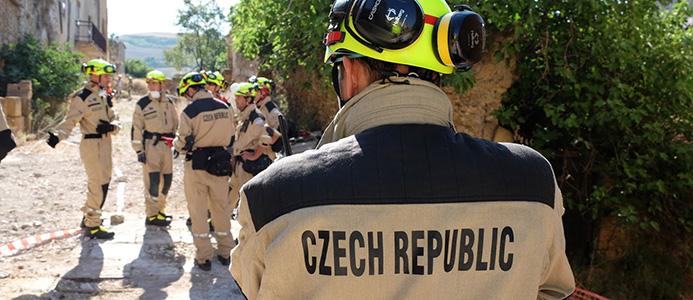
Overview
Crisis management is the analysis and evaluation of security risks and planning, organising, implementing and controlling activities undertaken in preparation for crisis situations and their solutions. In the Czech Republic, crises are either defined as related or unrelated to the provision of Defence of the Czech Republic against external attack.
On the basis of the Crisis Act, the Czech Republic could declare 4 crisis states: a state of danger, a state of emergency, a state of peril, and a state of war. The states are declared by regional governor (a state of danger), government (a state of emergency), parliament on proposal of the government (a state of peril), or parliament (state of war).
Prevention
Overview
The Czech Republic develops the risk assessment, which describes the procedure of risk identification and appoints the most significant ones, including a special part dedicated to the risks with high impact and low probability. To strengthen the response to major emergencies resulting from the most significant risks, the Czech Republic also develops 16 documents in a form of checklist, which describes such an emergency and appropriate measures to ensure an effective response. All the documents are available on the website of the Ministry of Interior - Directorate General of the Fire Rescue Service of Czechia (MoI – DG FRS CR).
Risk assessment
The international cooperation in the field of risk assessment takes place in particular within the membership to the EU and the Visegrad group.
Risk management planning
The risk management capability assessment describes the risk management planning in which there is constant consultation and monitoring.
The capabilities of the Czech Republic aim to mitigate the impact of a disaster. Measures are therefore designed to support the response. The risk management capability assessment describes in detail the technical, financial and administrative aspects of the following risks: floods, long-term drought, and disruptions to the electrical supply.
Risk communication and awareness raising
The public can get information on disaster risks via television and radio. The government also liaises with the press to promote suitable topics. Information and is available via websites and social networks, and via posters in public transportation and municipal buildings.
The public also have access to preventive educational activities. These include excursions to fire stations, educational events such as discussions and lectures, e-learning, conferences, workshops, and seminars.
Preparedness
Training and exercises
All members of the Fire Rescue Service (FRS) and members of other fire units are trained to provide effective help in emergencies.
The planning process starts by preparing the annual training plan. The preparation of annual and monthly exercise plans follows. Each fire station and each regional FRS have their own exercise plans, which are coordinated at national level to ensure that other services (regional Emergency Medical Services (EMS), the police, army and other bodies of the Integrated Rescue System of the Czech Republic (IRS CR) are incorporated into these plans.
Early warning systems
The United Alert and Notification System (UANS) is an early warning system used in the Czech Republic. The most common activations of the warning system are meteorological and hydrological phenomena. Based on warning from the Czech Hydrometeorological Institute (CHI) and after considering the extent and degree of risk, the UANS may be activated throughout the whole of the Czech Republic or in a chosen area only. The warning consists of several types of sirens and all available mass media. In the Czech Republic, the siren system has pre-recorded warnings such as dangerous flood wave, chemical accident, and radiation accident. People who live in the zone of emergency planning could be informed through mobile phones and they have available information leaflets informing of possible dangers and what to do in case of accident.
Emergency Response
The Czech Fire Brigade covers all areas of the Czech Republic. Firefighter units are part of the Integrated Rescue System of the Czech Republic, which is designed to coordinate rescue during emergencies. This system was developed in the Czech Republic in 2001 and includes fire protection units, EMS providers and the police. The Czech Republic is divided into 14 separate territorial areas and each of them is operated by the regional headquarters of the FRS, which administers its regional operational centre. These emergency centres can receive emergency calls from the national emergency number.
Cross-border, European and international cooperation
The Ministry of Interior is involved in engagement of the Czech Republic into international rescue operations in emergencies and in providing humanitarian assistance, in cooperation with the Ministry of Foreign Affairs. Ministry of Interior tasks are fulfilled through the Ministry of Interior – DG FRS CR. State humanitarian assistance is funded by financial resources allocated in the Ministry of Foreign Affairs’ budget. The Czech Republic has concluded governmental bilateral agreements on assistance in emergencies with all its neighbouring countries (Austria, Germany, Poland, and Slovakia) and with Hungary. The agreements specify joint training and education and mutual exchange of information. The Ministry of Interior MoI – DG FRS CR follows EU - Host Nation Support Guidelines.
Facts & figures
National contact point:
Ministry of Interior
Directorate General of Fire Rescue Service of the Czech Republic
Address:
Kloknerova 26
P.O.Box 69
148 01 Prague 414
Czech Republic
Tel: +420 950 819 820, 821
Fax: +420 950 819 958, +420 224 232 321
E-mail: opis grh [dot] izscr [dot] cz (opis[at]grh[dot]izscr[dot]cz)
grh [dot] izscr [dot] cz (opis[at]grh[dot]izscr[dot]cz)
More information
- Act No. 239/2000 Coll. on Integrated Rescue System (IRS)
- Act No. 240/2000 Coll., on crisis management and on amendments of certain act (Crisis act)
- Act No. 241/2000 Coll., on Economic Measures for Crisis Situation and on amendments of certain act
- Act No. 320/2015 Coll., on the Fire Rescue Service of CR and on the modification of certain codes
Related pages
Last updated: 20/09/2021
